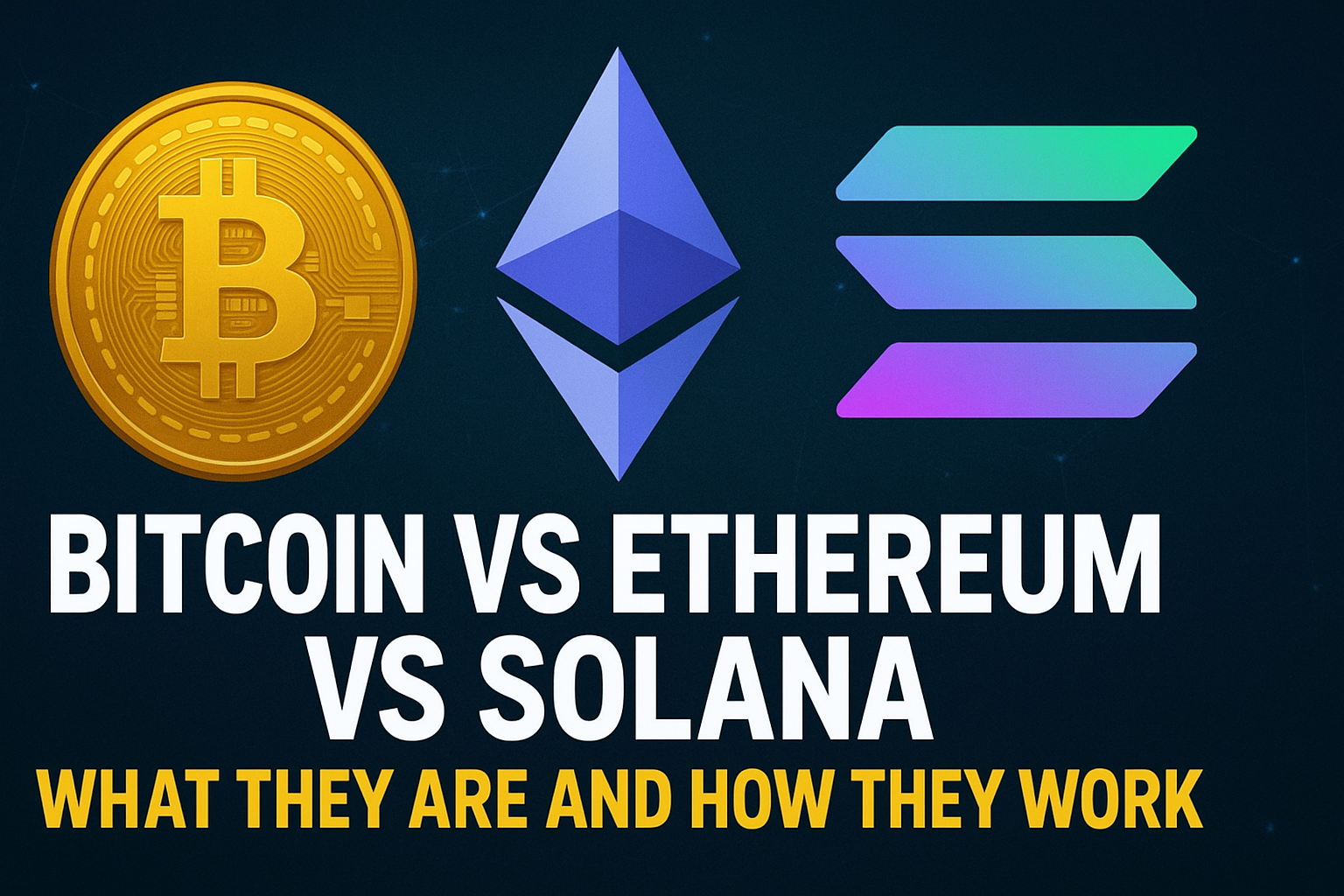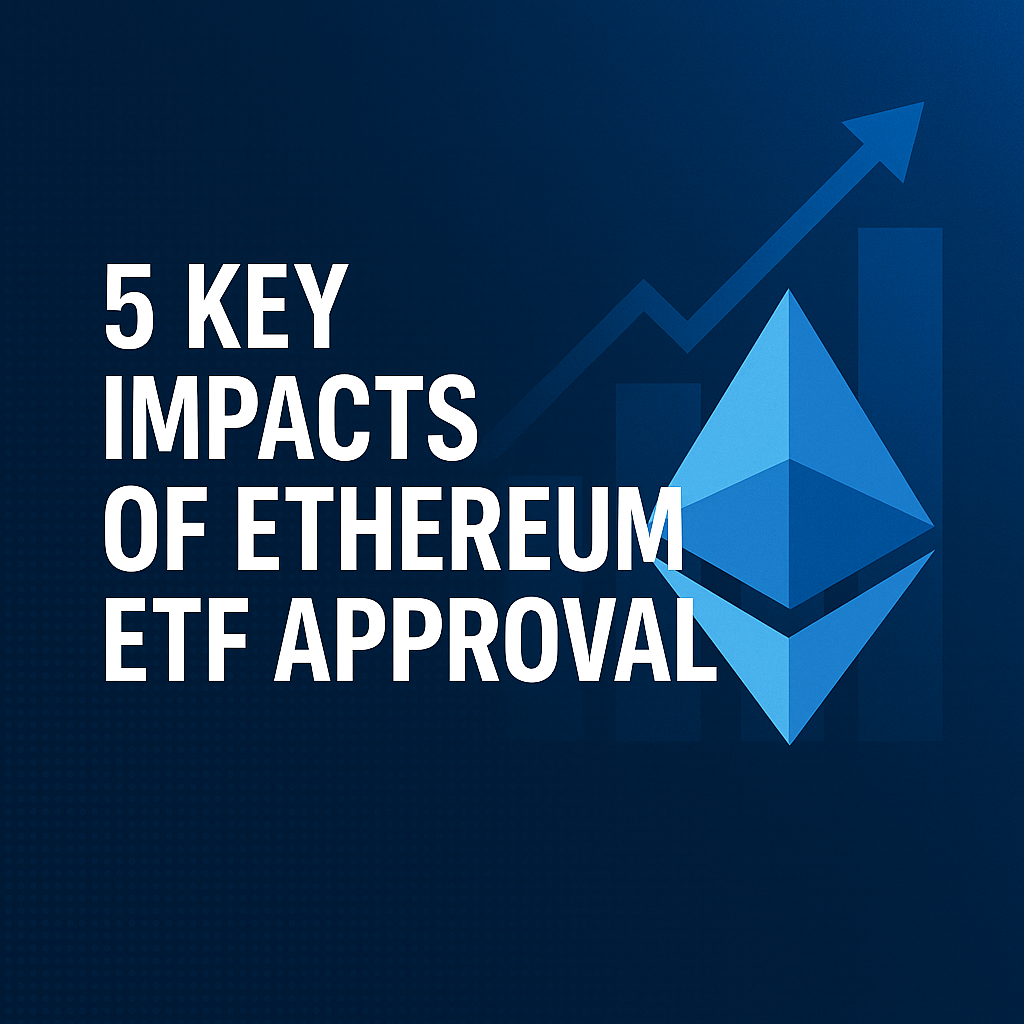Bitcoin vs Ethereum vs Solana: 7 Best Insights You Must Know in 2025

If you’ve ever heard friends chatting about Bitcoin vs Ethereum, or Solana over coffee and wondered what on earth they were talking about, you’re not alone. The world of crypto can feel like a giant maze of technical terms, memes, and rocket emojis.
But don’t worry—this article will walk you through what Bitcoin, Ethereum, and Solana actually are, why people care about them, and how they differ. Think of it as your friendly guide, written by someone who also got lost at first but slowly connected the dots.
Bitcoin vs Ethereum: The First Digital Gold
When people say Bitcoin (BTC), they’re usually talking about the granddaddy of all cryptocurrencies.
Launched in 2009 by an anonymous creator known as Satoshi Nakamoto, Bitcoin was the first decentralized digital currency. It works without banks, without governments, and without middlemen. Instead, Bitcoin runs on a technology called blockchain—a public ledger that records every single transaction.
Why Bitcoin Matters
- Scarcity: Only 21 million Bitcoins will ever exist. That limited supply is why some people compare it to digital gold.
- Security: Bitcoin’s network is extremely secure, backed by thousands of computers worldwide.
- Store of Value: Many see Bitcoin as “hard money,” a hedge against inflation, even if its price is volatile.
Fun Fact
The first real-world Bitcoin purchase was for two pizzas in 2010—costing 10,000 BTC. At today’s prices, those pizzas would be worth hundreds of millions of dollars. 🍕
Ethereum: The Programmable Blockchain
If Bitcoin is digital gold, Ethereum (ETH) is like a giant world computer. Launched in 2015 by Vitalik Buterin and a team of developers, Ethereum doesn’t just handle money transfers—it lets developers build applications right on its blockchain.
What Makes Ethereum Special?
- Smart Contracts: Self-executing agreements coded into the blockchain. For example, “If Alice sends ETH, then Bob automatically receives an NFT.”
- Decentralized Applications (dApps): Apps that don’t rely on central servers. Think games, decentralized finance (DeFi), or marketplaces.
- NFT Boom: Ethereum was the birthplace of the NFT craze, where people started buying and selling digital art, music, and collectibles.
Ethereum’s Upgrades
Ethereum has been transitioning to Ethereum 2.0, using a proof-of-stake system instead of proof-of-work. This change makes it more energy-efficient and scalable.
Solana: The Fast and Scalable Challenger
While Bitcoin and Ethereum are famous, Solana (SOL) has been making waves as the “speed demon” of crypto.
Launched in 2020 by Anatoly Yakovenko, Solana was designed to solve one big problem: scalability. Traditional blockchains struggle to handle thousands of transactions at once. Solana’s unique consensus system, called Proof of History (PoH), allows it to process thousands of transactions per second (TPS).
Why People Like Solana
- Low Fees: Transactions cost fractions of a cent, making it ideal for micro-payments.
- High Speed: Solana can theoretically handle up to 65,000 TPS, much faster than Ethereum.
- Growing Ecosystem: From NFT marketplaces to DeFi platforms, Solana is rapidly expanding.
Comparing Bitcoin, Ethereum, and Solana
Here’s a quick snapshot:
| Feature | Bitcoin | Ethereum | Solana |
|---|---|---|---|
| Launched | 2009 | 2015 | 2020 |
| Purpose | Digital currency, store of value | Smart contracts, dApps | High-speed scalable blockchain |
| Consensus | Proof of Work (PoW) | Proof of Stake (PoS) | Proof of History + PoS |
| Max Supply | 21 million | No fixed cap | No fixed cap |
| TPS (Transactions per Second) | ~7 | ~30 (before scaling) | ~65,000 (theoretical) |
Storytime: How I First Learned About These Coins
I still remember my first encounter with Bitcoin. A friend told me:
“You know you can send money to someone across the world in 10 minutes without using a bank?”
It sounded wild, almost like magic.
Later, I discovered Ethereum when I saw people trading digital cats in a game called CryptoKitties. And Solana? I first heard about it on Twitter when NFT projects started migrating there because Ethereum’s gas fees were too high.
That’s when I realized each of these coins solves a different problem:
- Bitcoin = Digital gold.
- Ethereum = Programmable money.
- Solana = Fast and cheap transactions.
Frequently Asked Questions (FAQ)
1. Is Bitcoin better than Ethereum or Solana?
Not really—it depends on your perspective. Bitcoin is the most secure and widely recognized. Ethereum is the hub for smart contracts. Solana is known for speed and low costs.
2. Can I invest in all three?
Yes, many people hold a mix. But remember: this article is just for information, not financial advice.
3. Which one is safest?
Bitcoin has the longest history and security track record. Ethereum and Solana are newer but offer different use cases.
4. Why are crypto prices so volatile?
Crypto markets are still young, and supply-demand shifts happen quickly. News, regulations, and hype all affect prices.
5. Do I need a special wallet?
Yes. You’ll need a crypto wallet to hold BTC, ETH, or SOL. Some wallets support multiple coins, while others are chain-specific.
Internal Links You Can Add (if you have articles)
- [Beginner’s Guide to Blockchain Technology]
- [How to Store Bitcoin Safely]
- [What is DeFi and Why It Matters?]
- [NFTs Explained in Simple Words]
These internal links help readers explore more and boost SEO at the same time.
Final Thoughts
Bitcoin, Ethereum, and Solana are three of the most popular cryptocurrencies, but they each play a very different role in the digital economy.
- Bitcoin is a secure store of value.
- Ethereum is the foundation for Web3 applications.
- Solana is pushing the boundaries of speed and scalability.
The world of crypto is still evolving, and no one knows exactly where it’s headed. But learning the basics of these three coins is a solid starting point for any beginner.
Disclaimer
This blog post is for general informational purposes only. It is not financial, legal, or investment advice. Always do your own research and, if necessary, consult a professional before making financial decisions.





